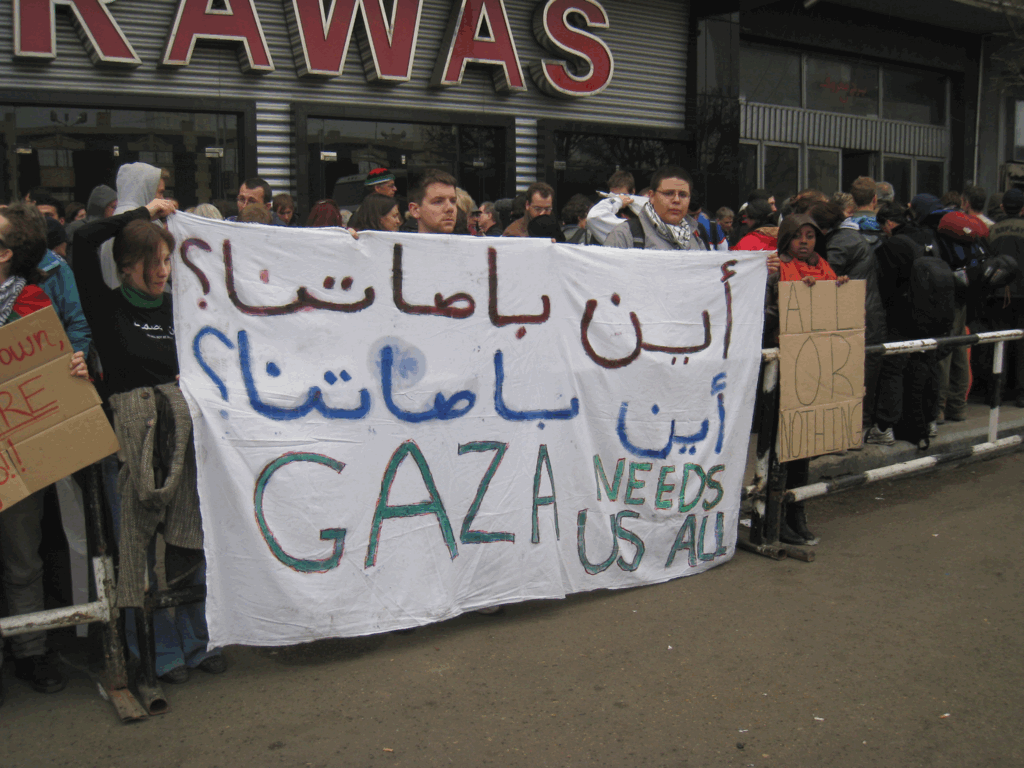The Gaza Freedom March (GFM) was an intense roller-coaster-ride of a week, from the divisive lows of name-calling and recriminations to the high-points of collective action in the streets of Cairo.
Many other GFM participants have chronicled the week in their own ways, in many cases much better than I can possibly reconstruct it here. For a clear chronology with photos that follow (part of) the Canadian delegation, I highly recommend Sarah Mahmoud’s beautifully put together Photos from the Gaza Freedom March blog. Danah Abdullah’s quirkily cool Yuppie Activist Notes from Egypt is a more personal take that covers many of the same events.
There is no question that Egypt’s mid-week offer to allow just two busloads of marchers into Gaza led to some of the most difficult moments of the whole week. When initially presented with the possibility of sending a “representative” handful of GFM delegates from each country, we were faced with the heart-rending task of choosing the few amongst ourselves who would go while the rest stayed in Cairo.
Shortly before leaving for Cairo I had been asked to coordinate the 57-person Canadian delegation -an highly challenging assignment at best, even if we had been able to meet together and communicate effectively as a group, and well-nigh impossible in Cairo where communications were extremely difficult, only a few of us had phones and most of us could only check e-mail sporadically. So it fell to me to try to get our delegation to select a list of just seven Canadians, within a few hours of getting the call on the evening of Tuesday December 29. The largest concentration of delegates were at the Journalist’s Syndicate building that evening (for a demonstration against Netanyahu’s visit to Egypt), so to the extent we could meet at all it was done against a backdrop of enthusiastic chants and excited speeches from Egyptians who were exhilarated to be demonstrating with a bunch of internationals against their government’s complicity with Israel. In small more-or-less regional groups we tried to come to some kind of “fair” decision as to who among us should get to go to Gaza.
Our Southwest Ontario delegation knew each better than most, and by the time we had selected our allotment of two people we were all in tears at the stress of the decision. Many of us felt that priority had to be given to the diaspora Palestinians amongst us, and I was happy that one of our spots was to go to Feras, a young Palestinian-Canadian student from London traveling to Gaza to visit his father whom he hadn’t seen in years. It seemed as fair as possible under heart-breakingly difficult circumstances… until the Québec delegation came and urged us to reject the offer of a token delegation entirely – either we should all go or none of us should. This sentiment quickly swept through the two Ontario groups (and most of the Western delegation), and Feras ended up giving an emotional speech (in English and in Arabic) renouncing his chance to go to Gaza, despite his compelling family ties, because of the importance of us all standing together.
We were proud of Feras and his decision – there were more tears, but by this time most of us felt much better about our stand, which we relayed to the international steering committee.
What followed was a hard night of exceedingly difficult meetings, with some delegates actually accusing Canadians of “causing problems” because of our decision to boycott the two-bus offer, while the South African delegation congratulated us on our principled decision, which they and a number of other national delegations ended up agreeing with. Unfortunately, communications being far from optimal, some Canadian GFM participants were not able to be part of our group decision, and some of them ended up being among those who got on the two buses the following morning.
The rest of us decided that while we sure of our decision not to go, we would not condemn those who were going. We showed up for the bus send-off to load our humanitarian donations onto the buses, and with a banner that read (in Arabic) Where are our buses? (and in English) Gaza needs us all. Others were less conciliatory and tempers flared on both sides (leading to an ugly, divisive scene).
Meanwhile, the Egyptian Foreign Minister came out with a statement claiming that they had selected one hundred “good elements” of the GFM while the “bad ones” were those of us left in the street in Cairo. This was of course a complete falsehood (regarding how the selection had come about) but had the effect of convincing some of those who had initially got on the buses to reconsider their decision. The International Steering Committee announced they had made a mistake and that they were withdrawing from the two-bus project entirely – I personally feel they deserve great respect having the political maturity to recognize their error in the midst of a very difficult situation. As spaces became available, other individuals from the GFM (who had been selected by nobody but happened to be in the right place at the right time) added themselves to the two-bus delegation. As Filipino parliamentarian Walden Bello (who had originally been asked to lead the two-bus mini-delegation but ended up deciding to stay in Cairo) puts it “The 65 who eventually left represented no one but themselves, and they faced an uncertain reception in Gaza.”
Our friends from civil society movements in Gaza ended up boycotting the mini-march that happened there on January 31 with token the representatives from the two buses. With that key absence, one of the Canadians who went on the buses to Gaza reports that she felt like their visit was entirely stage-managed by Hamas and that the real Gaza Freedom March was the one that took place in Cairo on December 31.



